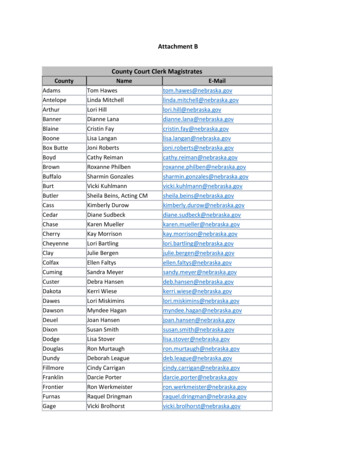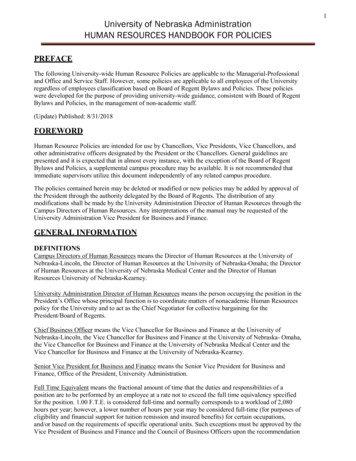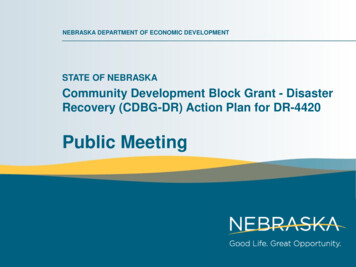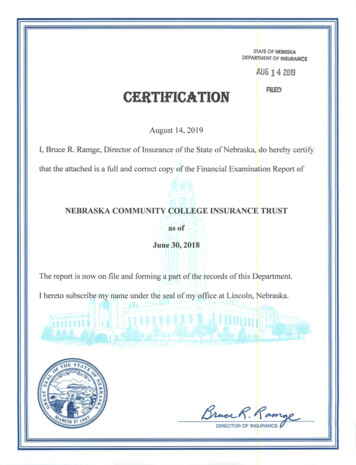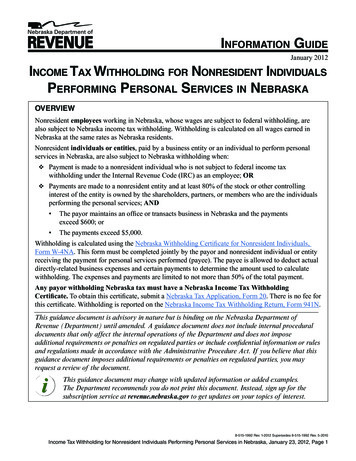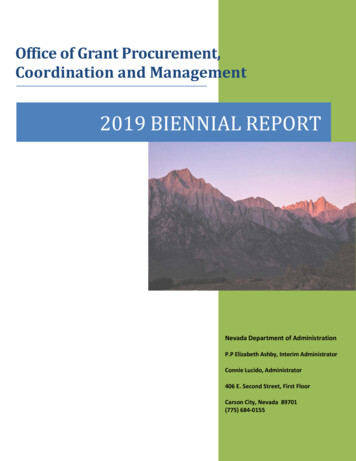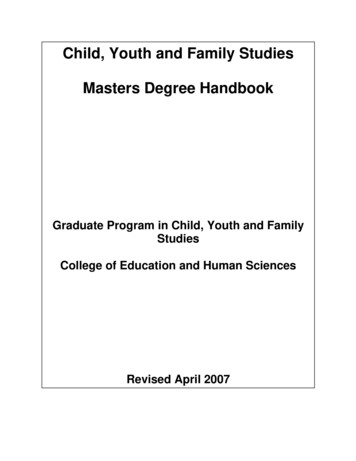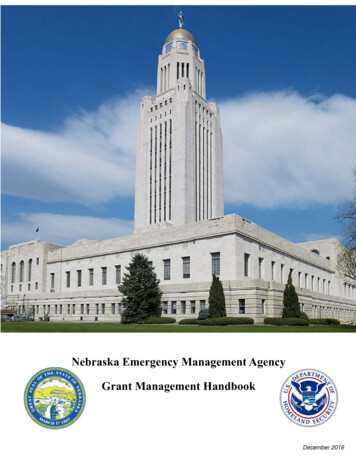
Transcription
Nebraska Emergency Management AgencyGrant Management HandbookDecember 2016
NEBRASKA EMERGENCY MANAGEMENT AGENCYGRANT MANAGEMENT HANDBOOKJune, 2016This plan is hereby approved and supersedes all previous versions.
RECORD OF CHANGESCHANGENUMBERPAGESCHANGED/SECTIONDATE OFCHANGEDATEENTEREDCHANGE MADE BY(SIGNATURE)
Table of ContentsRecord of Changes . 2Table of Contents. 3Chapter 1 Welcome . 5Who to Call . 8NEMA Organizational Chart . 9Chapter 2 Grant Management Basics, Rules and Requirements. 11Ten Easy Rules for Grant Management . 13Grant Management Basics . 14Chapter 3 Policies and Procedures . 17Grant Program Overview. 19Reporting Requirements . 21Grant Compliance . 22Federal and State Audit Findings . 23Environmental and Historic Preservation Procedures . 26Chapter 4 Certification and Assurances . 27Certifications . 29Contracting . 33Justification for Non-Competitive Procurement . 38Procurement Policies . 39Chapter 5 Specific Grant Reference Materials . 41Documents Applicable to All Grants . 43Sample ACH Form . 45Sample W-9 Form . 49Monitoring Documents . 55Equipment Inventory List (excludes HMEP) . 65Homeland Security Grant Program (HSGP) . 69HSGP Grant Overview . 71Work Plan Template . 92Sample Grant Adjustment Notice (GAN). 97PET Request Form . 102Sample Overtime and Backfill Reimbursement Form . 107Sample Local Purchase Submission Coversheet . 1093
Emergency Management Performance Grant (EMPG) . 111EMPG Guidance . 113EMPG Application . 123EMPG Project Outlines . 126Sample EMPG Grant Adjustment Notice (GAN) . 129EMPG Reimbursement Form . 137EMPG Mileage Form . 141Sample Local Purchase Submission Coversheet . 145EMPG FFATA Form . 149Hazardous Materials Emergency Planning (HMEP) . 153HMEP Guidance . 155Sample HMEP – LEPC Mini Grant Application . 164Sample HMEP – LEPC Reimbursement . 167Other Attachments . 171PET Regional Map . 173EMPG Map. 177List of Acronyms . 181Glossary . 1854
Chapter 1Welcome5
6
Welcome toGrant ManagementYour jurisdiction has been awarded federal grant funding through the Nebraska EmergencyManagement Agency (NEMA). Receipt of grant funds is important, but grants involveresponsibility and proper management. As a grant administrator you assume the overallresponsibility for ensuring that the grant is implemented within the established parametersand grantor agency regulations. Please review this handbook carefully, whether you are afirst time or a veteran grant administrator.NEMA, along with the Homeland Security Policy Group, has developed a grant philosophythat enables state agencies, counties and local jurisdictions to benefit from, and maximize,this important resource. However, please understand that receipt of a grant award does notimply that your program or plan will be automatically continued when the grant funds nolonger exist. Future funding is dependent upon federal appropriations and therefore isnot guaranteed.It is extremely important that grant funds are expended in a timely manner in accordancewith the proposed plan. Remember, your grant was awarded based on yourapplication/workplan and you are expected to follow through on those intentions. Weanticipate a “good faith” effort on your part and will work with you if unexpectedcircumstances necessitate a modification of the approved plan or budget.The basic objectives for all grant administrators are: To monitor grant activities, expenditures and deadlines to ensure that thecitizens of Nebraska receive the maximum benefit; To ensure that all purchases are aligned to the grant plan; To prepare and file reports on time; and To ensure that grant funds are not returned to the grantor agency.Congratulations on this award!7
Who to CallThe following people may assist you with questions about your grant:Nikki WeberPreparedness Section Managernikki.weber@nebraska.govGrants Manager402-471-7226Julie MayersFederal Aid Administrator Supervisorjulie.mayers@nebraska.govGrants Supervisor402-471-5088Tonya NgotelState Emergency Response Commission(SERC) Coordinatortonya.ngotel@nebraska.govHMEP Mini-Grants402-471-7176Ryan LowryState Citizen Corps Program (CCP) andMedical Reserve Corps (MRC) i SuarezFederal Aid Administratormerci.suarez@nebraska.govGrants Program Monitor402-471-7413Dan HillerPlanning Unit Supervisordan.hiller@nebraska.govInvestment JustificationsHomeland Security Policy GroupHomeland Security Planning Team402-471-7419Jackie MalyFederal Aid Administratorjackie.maly@nebraska.govReimbursement Coordinator402-471-7412Logan LuekingProgram Specialistlogan.lueking@nebraska.govEnvironment and Historical PreservationReview Coordinator402-471-7427NOTE: Call or email the above first; if they don’t have the answers they will direct you toother agencies and/or departments that may be of assistance.8
9
THIS PAGE INTENTIONALLY HAS NO DATA10
Chapter 2Grant Management Basics,Rules, and Requirements11
12
Ten Easy RulesForGrant Management1. Read the grant guidance to make sure you understand the requirements.2. Participate in the Investment Justification Workshop (SHSP) to ensure that yourneeds are included in the investment justification.3. Create a detailed and specific workplan/application and make sure eachexpenditure can be justified.4. Discuss the program and budget with the region/county-level grant administratorand designate a project contact person.5. Follow directions, grant requirements, regulations and special conditions.6. Implement the program as it is written.7. Spend the money in a timely manner, do not spend money on items that are notin the budget; do not spend more money than you have been allocated; and donot make purchases without prior approval.8. Meet all deadlines.9. Keep your NEMA grant manager(s) informed of all matters pertaining to yourgrant(s).10. Keep good and accurate records.13
GRANT MANAGEMENT BASICSI.WHAT IS EFFECTIVE GRANTS MANAGEMENT?A process (or result) of adequate oversight and monitoring of federalassistance awards that includes project resources, activities and results; aprocess that begins before the award is signed.II.PURPOSE OF EFFECTIVE GRANTS MANAGEMENTA. AccountabilityB. Accomplishment of program goalsC. Accomplishment of performance goals and adequate progress of theprogramD. Compliance with grant terms, laws and regulationsE. Federal funds expended as awarded and budgetedF. Stewardship of public fundsIII.WHAT IS MONITORING?An ongoing assessment of the progress of activities being funded, todetermine if the terms and conditions of the award are being met.IV.WHAT IS THE PURPOSE OF MONITORING?Informal and formal oversight to ensure grantees are planning and doing whatthey said they would plan and do.V.FACTORS THAT DETERMINE MONITORING LEVELA. Experience and capacity of the grantee and grant staff1. Corporate culture and management importance given to grantsactivities2. Organizational and staffing changes3. Decentralization of grants management4. Staff resources5. Lack of central electronic grants management systemB. Dollar amount of awardC. Program visibility14
VI.MONITORING TECHNIQUESA.B.C.D.E.F.G.VII.MONITORING DOCUMENTATIONA.B.C.D.VIII.Pre-award risk assessmentSite visits and desk reviewsTelephone callsEnforcement of prior approvalsAnalysis and timeliness of reportsProvision of technical assistance and supportResults of prior monitoring, or prior Single Audit reports, or Office of theInspector General (OIG)Grant monitoring reportGrant monitoring memorandumCorrespondence and emailsDetails of recommended corrective action and actions implementedRISK INDICATORS AND PROBLEMSA. Dollar amount of AwardB. Grant program guidance complexity and related pitfallsC. Reporting1. Comparison of actual results with stated goals and objectives,timelines2. Reasons goals and objectives were not met3. Narrative report supports financial expenditures4. Financial report correlates to and supports narrative progressD. Performance Measures1. Assess impact and value or programs and projects2. Demonstrate program and project accountability, results3. Techniques: evaluations, data collection, analysis of data, reports, etc.E. Prior negative history with grantee1.2.3.4.Programmatic or project-relatedFinancialIntentional (disregard for grant requirements, laws, regulations, etc.)Unintentional (lack of knowledge and experience)15
THIS PAGE INTENTIONALLY HAS NO DATA16
Chapter 3Policies and Procedures17
18
GRANT PROGRAMS OVERVIEWI.PURPOSEPolicies and procedures that shall be utilized by the Nebraska EmergencyManagement Agency (NEMA), and sub-recipients, receiving grant fundingadministered by NEMA.II.NEMA GRANT PROGRAMNEMA will administer the Grant Programs in a fair, impartial and professionalmanner to enhance the security of Nebraska and its citizens. It is the policy ofNEMA to ensure that grant program guidance, federal reporting requirements,and all applicable Office of Management and Budget (OMB) circulars areadhered to by NEMA and all sub-recipients of funds.A. State Homeland Security Grant (SHSP) ProgramSHSP is a federally funded grant program administered by the GrantPrograms Directorate within the U.S. Department of Homeland Security(DHS)/Federal Emergency Management Agency (FEMA). The purpose ofthe SHSP is to enhance the state’s capability to prevent, respond andrecover from an act(s) of terrorism. This is accomplished through theacquisition of specialized equipment, training, planning and exercising.1. State Administrative Agency - Pursuant to policy of the U.S.Department of Homeland Security, each governor is required toappoint an agency to administer the State Homeland Security GrantProgram on behalf of his/her state. In Nebraska, that agency is NEMA.2. Sub-recipient - Any local, regional or state agency/entity that has beenawarded funds by NEMA in its role as State Administrative Agency(SAA) of the State Homeland Security Grant program.3. Programs allowed under SHSP still include:a. Metropolitan Medical Response System (MMRS)b. Citizen Corps Program (CCP)B. Emergency Management Performance Grant (EMPG)EMPG is a performance based matched grant administered through19
FEMA. This grant funds emergency management activities on a 50/50matching basis with residual monies being passed to local jurisdictionsparticipating in the Emergency Management Performance Grant (EMPG)program.The Assistant Director is responsible for grant application, thePreparedness Section Manager is responsible for grant managementthrough quarterly reporting and final reporting and the Business Manageris responsible for all fiscal reports.C. Hazardous Material Emergency Preparedness Grant (HMEP)HMEP is a grant provided by the Department of Transportation fundingHazMat Planning, Administration and Training for the State. This grantsupports the Nebraska Hazardous Incident Team (NHIT) and the LocalEmergency Planning Committees (LEPCs).20
REPORTING REQUIREMENTSI.2 CFR 200 REPORTING REQUIREMENTSA. NEMA is subject to the requirements of 2 CFR 200, and, as such, requiresNEMA to monitor sub-recipients of federal awards and determine whetherthey have met the single audit requirements of the circular, and whetherthey are in compliance with federal laws and regulations.B. Sub-recipients must submit an audit report to the Federal AuditClearinghouse if they expend more than 750,000 in federal funds in onefiscal year. The Federal Audit Clearinghouse submission requirementscan be found at http://harvester.census.gov/sac/.C. A copy of the report must be submitted to NEMA/SAA each year the grantis active. Sub-recipient shall comply with the single audit requirements setforth in 2 CFR 200.II.FEDERAL FUNDING ACCOUNTABILITY AND TRANSPARENCY ACT(FFATA)The Federal Funding Accountability and Transparency Act (FFATA) wassigned on September 26, 2006. The intent is to empower every American withthe ability to hold the government accountable for each spending decision.The end result is to reduce wasteful spending in the government. The FFATAlegislation requires information on federal awards (federal financial assistanceand expenditures) be made available to the public via a single, searchablewebsite, which is www.USASpending.gov.21
GRANT COMPLIANCEKeep in mind the following rules regarding grant compliance.I.Grant dollars must support, and be spent on, services and commoditiesspecified in the grant application/workplan. In some instances, budgetamendments may be written if the line for that budget category supports theapplication/workplan. These changes must have prior approval from NEMAgrant administration.II.Make sure you keep a valid paper trail that justifies your expenditures. Allgrants are subject to audit. Keep a notebook or folder that is dedicated to thegrant project. Keep records of purchase orders, invoices, budget amendments,and other support documentation. These records are subject to audit for threeyears after the grant is closed.III.File all required reports in a timely manner. All grants require some type ofreport – these may be quarterly, mid-term, and/or final reports. Your failure tosend or complete these reports could jeopardize future funding for yourjurisdiction.IV.Always read the special conditions of the award to make sure you know whatNEMA is requiring of you. Discuss any requirements that are unclear orproblematic with NEMA grant administration. Good grant management isbased on a trust factor between the grantor agency and the grant recipient.The local grant administrator should inform NEMA of any concerns regardingthe implementation of the program or compliance with grant regulations.22
FEDERAL & STATE AUDIT FINDINGSI.PURPOSETo highlight a list of common audit findings and to guide you toward effectivegrant management.II.MONITORINGNEMA, as the grantee, must monitor the execution of projects to assureadherence to performance goals, time schedules or other requirements asappropriate to the projects or the terms of the grant agreement. NEMA isresponsible for monitoring the activities of and pass-through requirements toany sub-recipients.III.AUDITSA. Grant budgets are subject to both internal and external audits. Thisscrutiny requires:1. Detailed justification of all expenditures2. Evaluation of all expenditures in relation to program componentsB. The expenditures must support the development or implementation of theproject/program as specified in the grant application. Any modificationsmust have the approval of NEMA.C. NEMA is subject to the requirements of Audits of States, LocalGovernments, and Non-Profit Organizations, which as of FY’2015 hasbeen incorporated into 2 CFR 200.501 (formerly A-133 Audits). As such, 2CFR 200.501 requires NEMA to monitor sub-recipients of federal awardsand determine whether they have met the audit requirements of thecircular, and whether they are in compliance with federal laws andregulations. Sub-recipients must submit an audit report to the FederalAudit Clearinghouse if they expend more than 750,000 in federal funds inone fiscal year.IV.TOP AUDIT FINDINGSA. Experience has shown that the top findings from Federal Office of theInspector General (OIG) and Nebraska State Auditor of Public Accountsaudits are as follows:23
1. Untimely submission of reports – Narrative and financial reports arenot submitted when due.2. Lack of documentation – The sub-recipient does not have adequateinvoices or other documentation to back up the expenditure of funds.3. Inadequate monitoring of Contractors – The sub-recipient is failing tomonitor its contractors to ensure that they are spending their funds incompliance with all federal laws and regulations.4. Inadequate time and effort records – The sub-recipient has failed tokeep adequate time and effort records documenting the time that itsemployees, volunteers, and consultants, have worked on the activitiesrelated to the project.5. Inaccurate reports – The financial status reports submitted do notagree with the financial records of the organization. The subrecipient’s request for payments does not correlate with its need forfunds.6. Co-mingling of funds – The sub-recipient’s accounting system isunable to accurately identify the receipt and expenditure of funds withthe proper award.7. Excess cash on hand – The sub-recipient is not managing itsdrawdown of funds to coincide with expenditures to avoid havingexcess federal funds on hand.8. Unallowable costs – The sub-recipient has expended federal funds oncost items that are unallowable under 2 CFR 200.9. Inappropriate changes – The sub-recipient has made budget changesand/or changes in the scope of the project without requesting priorapproval from its program office.10. Conflicts of interest – The sub-recipient has conflicts of interest or theappearance of conflicts of interest in its procurement procedures orother management of the federal funds.11. Federal Procurement Rules – All procurement transactions must beconducted in a manner providing fair and open competition, andquotations must be obtained from an adequate number of sources.24
V.REPORTSA. Program and budget reports are required on all grants. Detailed recordkeeping initiated at the beginning of the grant period will help facilitate thisprocess. Reports must be submitted on time. See your specific grantsection for other reporting requirements.1. Federal Financial Accountability and Transparency Act (FFATA)VI.DEADLINESAll program and financial deadlines must be met. Contact your grant managerif you have a problem meeting a deadline.25
Environmental and Historic Preservation ProceduresSub-recipients need to initiate an Environmental and Historic Preservation (EHP) reviewfor FEMA Preparedness Grant funded projects. EHPs are required for:1. Projects that involve the purchase of equipment that will requireinstallation on or in a building or structure,2. Training exercises with any field-based components, such as drills or fullscale exercises,3. Projects that involve renovations, upgrades, retrofits, and installation ofequipment or systems in or on a building or structure,4. Projects that involve installation of new or replacement generators, toinclude the concrete pads, underground fuel and electric lines, and ifnecessary, a fuel storage tank,5. Projects that involve new construction, addition to, or expansion of afacility. These projects involve construction of a new building, orexpansion of the footprint or profile of a current structure, and6. Involve construction of new or replacement communications towers, orinstallation of communications-related equipment on a tower or building orin a communications shelter or building.There is no need to complete an EHP if the grant’s scope of work is limited to; planning,management and administration, classroom-based training, tabletop exercises andfunctional exercises, or purchase of mobile and portable equipment where noinstallation is needed.In order to initiate an EHP review of a project, sub-recipients must complete all relevantsections of the FEMA EHP screening form and submit it to NEMA’s EHP ReviewCoordinator, Logan Lueking. Once NEMA receives a completed EHP screening form, itthen is forwarded to FEMA for review. If the FEMA reviewers have any questions forclarification, they will be pass that request through NEMA to the sub-recipient. TheFEMA review usually takes between 10-14 days. Once NEMA is notified of EHPapproval, the sub-recipient will be notified.Given the time constraints placed on obtaining an approved EHP for some instances,sub-recipients of the EMPG grant may move forward with the EHP process prior toseeking approval from the NEMA EMPG Grant Manager, Nikki Weber for allowabilityunder the grant. Once an EHP approval is obtained, request for allowability must besent to the Grant Manager for final project approval. The Grant Manager will review anddetermine allowability and if funds are available to fund priority #3 Equipment. Ifapproval is given, then a purchase can be made.If an EHP is denied, or if a project is completed without an EHP review, said project isineligible for grant reimbursement.26
Chapter 4Certification andAssurances27
28
Certifications Regarding Debarment, Suspension and OtherResponsibility Matters; Hotel & Motel Fire Safety Act; DrugFree Workplace Requirements;Lobbying; Federal Debt Status; And NondiscriminationSigning the Terms and Conditions attached to the Sub-Recipient Agreement indicatescompliance with the statutes and regulations cited below.1.DEBARMENT, SUSPENSION, AND OTHER RESPONSIBILITY MATTERSAs required by Executive Order 12549 and implemented at 45 C.F.R. Part 1185, theundersigned, on behalf of the applicant, certifies to the best of his or her knowledge andbelief that neither the applicant, nor its principals:(a) are presently debarred, suspended, proposed for debarment, declaredineligible, or voluntarily excluded from covered transactions by any Federaldepartment or agency;(b) have within a three-year period preceding this proposal been convicted of orhad a civil judgment rendered against them for commission of fraud or acriminal offense in connection with obtaining, attempting to obtain, orperforming a public (Federal, state or local) transaction or contract under apublic transaction, or in connection with a violation of Federal or state antitruststatutes or commission of embezzlement, theft, forgery, bribery, falsificationor destruction of records, making false statements, or receiving stolenproperty;(c) are presently indicted for or otherwise criminally or civilly charged by agovernmental entity (Federal, state or local) with commission of any of theoffenses enumerated in paragraph (b) of this certification;(d) have within a three-year period preceding this application/proposal had one ormore public transactions (Federal, state or local) terminated for cause ordefault.Where the applicant is unable to certify to any of the statements in this certification, heor she shall attach an explanation to this application.2.HOTEL AND MOTEL FIRE SAFETY ACTPursuant to Public Law 101-391, no Federal funds may be used to sponsor or fund inwhole or in part a meeting, convention, conference or training seminar that is conductedin, or that otherwise uses the rooms, facilities, or services of a place of publicaccommodation that do not meet the requirements of the fire prevention and controlguidelines as described in the Public Law. This restriction applies to publicaccommodations both foreign and domestic.29
3.DRUG-FREE WORKPLACE REQUIREMENTSAs required by the Drug-Free Workplace Act of 1988 and implemented at 45 C.F.R.Part 1185, the undersigned, on behalf of the applicant, certifies that the applicant will orwill continue to provide a drug-free workplace by:(a) publishing a statement notifying employees that the unlawful manufacture,distribution, dispensing, possession or use of a controlled substance isprohibited in the grantee’s workplace and specifying the action that will betaken against employees for violation of such prohibition;(b) establishing an ongoing drug-free awareness program to inform employeesabout:(1) the dangers of drug abuse in the workplace;(2) the grantee’s policy of maintaining a drug-free workplace;(3) any available drug counseling, rehabilitation, and employee assistanceprograms; and(4) the penalties that may be imposed on employees for drug abuse violationsoccurring in the workplace;(c) making it a requirement that each employee to be engaged in theperformance of the grant be given a copy of the statement required byparagraph (a);(d) notifying the employee in the statement required by paragraph (a) that, as acondition of employment under the grant, the employee will(1) abide by the terms of the statement; and(2) notify the employer in writing of his or her conviction for a violation of acriminal drug statute occurring in the workplace not later than five calendardays after such conviction;(e) notifying the agency in writing within ten (10) calendar days after receivingnotice under subparagraph (d)(2) from an employee or otherwise receivingactual notice of such conviction. Employers of convicted employees mustprovide notice, including position title, to every grant officer on whose grantactivity the convicted employee was working, unless the Federal agency hasdesignated a central point for the receipt of such notices. Notices shall includethe identification number(s) of each affected grant;(f) taking one of the following actions within thirty (30) days of receiving noticeunder subparagraph (d)(2) with respect to any employee who is so convicted:(1) taking appropriate personnel action against such an employee, up to andincluding termination consistent with the requirements of the RehabilitationAct of 1973, as amended (29 U.S.C. § 701 et seq.); or(2) requiring such employee to participate satisfactorily in a drug abuseassistance or rehabilitation program approved for such purposes by aFederal, state, or local health law or other appropriate agency;30
(g) making a good faith effort to continue to maintain a drug-free workplacethrough implementation of paragraphs (a), (b), (c), (d), (e), and (f).The applicant either shall identify the site(s) for the performance of work done inconnection with the project in the application material or shall keep this information onfile in its office so that it is available for Federal inspection. The street address, city,county, state, and zip code should be provided whenever possible.4.LOBBYINGAs required by Section 1352, Title 31 of the United States Code, and implemented forpersons entering into a grant or cooperative agreement over 100,000, the applicantcertifies to the best of his or her knowledge and belief that:(a) No Federal appropriated funds have been paid or will be paid, by or on behalfof the undersigned, to any person for influencing or attempting to influence anofficer or employee of any agency, a Member of Congress, an officer oremployee of Congress, or an employee of a Member of Congress inconnection with the awarding of a Federal contract, the making of a Federalgrant, the making of a Federal loan, the entering into of a cooperativeagreement, or the extension, continuation, renewal, amendment, ormodification of a Federal contract, grant, loan, or cooperative agreement.(b) If any funds other than appropriated Federal funds have been paid or will bepaid to any person (other than a regularly employed officer or employee of theapplicant) for influencing or attempting to influence an officer or employee ofany agency, a Member of Congress, an officer or employee of Congress, oran employee of a Member of Congress in connection with this Federalcontract, grant, loan, or cooperative agreement, the undersigned shallrequest, complete, and submit Standard Form LLL, “Disclosure of LobbyingActivities,” in accordance with its instructions.(c) The undersigned shall require that the language of this certification beincluded in the award documents for all sub-awards
FEMA. This grant funds emergency management activities on a 50/50 matching basis with residual monies being passed to local jurisdictions participating in the Emergency Management Performance Grant (EMPG) program. The Assistant Director is responsible for grant application, the Preparedness Section Manager is responsible for grant management
